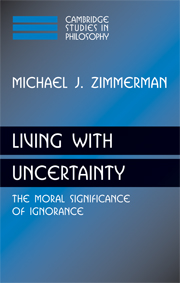4 - Ignorance and responsibility
Published online by Cambridge University Press: 22 September 2009
Summary
The previous three chapters have been devoted to setting out in some detail the way in which ignorance affects moral obligation. Three views were distinguished. According to the Objective View, ignorance does not affect obligation at all; on this view, it is the facts that determine what one ought morally to do, irrespective of one's knowledge of those facts. (The relevant facts are those that concern the actual values of one's alternatives.) According to the Subjective View, on the contrary, ignorance does affect obligation; on this view, it is one's beliefs that determine what one ought morally to do, and if one's beliefs part company with the relevant facts, then so much the worse for those facts. Ignorance affects obligation according to the Prospective View, too; on this view, however, it is not one's beliefs but one's evidence that determines what one ought morally to do, and if one's evidence parts company either with the relevant facts or with one's beliefs about the facts, then, once again, so much the worse for those facts and those beliefs. It is the Prospective View that I have sought to defend and develop.
I want now to address a different issue: the way in which ignorance affects moral responsibility. I am concerned here with “responsibility” in its backward-looking sense: responsibility for things that have happened in the past. (“Responsibility” also has a forward-looking sense: responsibility for things that may happen in the future.
- Type
- Chapter
- Information
- Living with UncertaintyThe Moral Significance of Ignorance, pp. 169 - 205Publisher: Cambridge University PressPrint publication year: 2008



